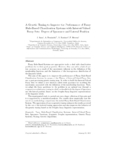Mostrar el registro sencillo del ítem
A genetic tuning to improve the performance of fuzzy rule-based classification systems with interval-valued fuzzy sets: degree of ignorance and lateral position
| dc.creator | Sanz Delgado, José Antonio | es_ES |
| dc.creator | Fernández, Alberto | es_ES |
| dc.creator | Bustince Sola, Humberto | es_ES |
| dc.creator | Herrera, Francisco | es_ES |
| dc.date.accessioned | 2015-07-27T09:49:28Z | |
| dc.date.available | 2015-07-27T09:49:28Z | |
| dc.date.issued | 2011 | |
| dc.identifier.issn | 0888-613X | |
| dc.identifier.uri | https://hdl.handle.net/2454/17684 | |
| dc.description.abstract | Fuzzy Rule-Based Systems are appropriate tools to deal with classification problems due to their good properties. However, they can suffer a lack of system accuracy as a result of the uncertainty inherent in the definition of the membership functions and the limitation of the homogeneous distribution of the linguistic labels. The aim of the paper is to improve the performance of Fuzzy Rule-Based Classification Systems by means of the Theory of Interval-Valued Fuzzy Sets and a post-processing genetic tuning step. In order to build the Interval-Valued Fuzzy Sets we define a new function called weak ignorance for modeling the uncertainty associated with the definition of the membership functions. Next, we adapt the fuzzy partitions to the problem in an optimal way through a cooperative evolutionary tuning in which we handle both the degree of ignorance and the lateral position (based on the 2-tuples fuzzy linguistic representation) of the linguistic labels. The experimental study is carried out over a large collection of data-sets and it is supported by a statistical analysis. Our results show empirically that the use of our methodology outperforms the initial Fuzzy-Rule Based Classification System. The application of our cooperative tuning enhances the results provided by the use of the isolated tuning approaches and also improves the behavior of the genetic tuning based on the 3-tuples fuzzy linguistic representation. | en |
| dc.description.sponsorship | This work was supported in part by the Spanish Ministry of Science and Technology under projects TIN2008-06681-C06-01 and TIN2010-15055. | en |
| dc.format.mimetype | application/pdf | en |
| dc.language.iso | eng | en |
| dc.publisher | Elsevier | en |
| dc.relation.ispartof | International Journal of Approximate Reasoning 52 (2011) 751–766 | en |
| dc.rights | © 2011 Elsevier Inc. The manuscript version is made available under the CC BY-NC-ND 4.0 license | en |
| dc.rights.uri | https://creativecommons.org/licenses/by-nc-nd/4.0/ | |
| dc.subject | Fuzzy rule-based classification systems | en |
| dc.subject | Interval-valued fuzzy sets | en |
| dc.subject | Ignorance functions | en |
| dc.subject | Linguistic 2-tuples representation | en |
| dc.subject | Genetic fuzzy systems | en |
| dc.subject | Tuning | en |
| dc.subject | Genetic algorithms | en |
| dc.title | A genetic tuning to improve the performance of fuzzy rule-based classification systems with interval-valued fuzzy sets: degree of ignorance and lateral position | en |
| dc.type | Artículo / Artikulua | es |
| dc.type | info:eu-repo/semantics/article | en |
| dc.contributor.department | Automática y Computación | es_ES |
| dc.contributor.department | Automatika eta Konputazioa | eu |
| dc.rights.accessRights | Acceso abierto / Sarbide irekia | es |
| dc.rights.accessRights | info:eu-repo/semantics/openAccess | en |
| dc.identifier.doi | 10.1016/j.ijar.2011.01.011 | |
| dc.relation.publisherversion | https://dx.doi.org/10.1016/j.ijar.2011.01.011 | |
| dc.type.version | Versión aceptada / Onetsi den bertsioa | es |
| dc.type.version | info:eu-repo/semantics/acceptedVersion | en |






